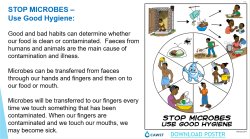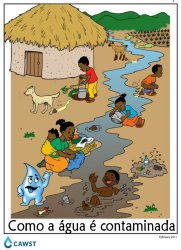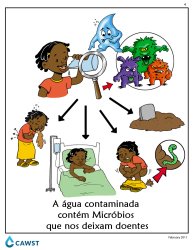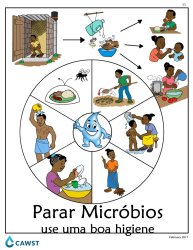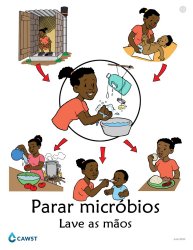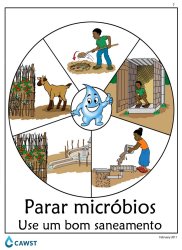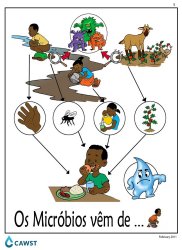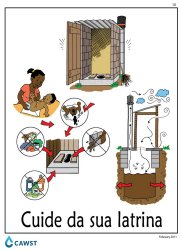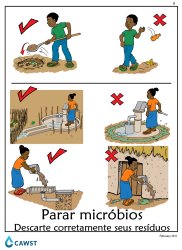
|
 Contact UsGota de Esperança
Crescer e Ir CurrículoProjeto Escola Gota de EsperançaTreinamento de Discipulado InfantilEvangelismo InfantilPaíses SelecionadosCurrículo da UCT |
casa>>crescer e ir >>gota de esperança>>boa higiene Gota de Esperança - Boa Higiene Embedded Microsoft Office presentation, powered by Office.
How Water is Contaminated Water that contains microbes and other pollutants is contaminated. Human and animal faeces are the main source of water contamination. Water is contaminated when people and animals defecate in an open field or near a water source and when latrines are not properly used and maintained. The faeces get into the water and are spread to everyone who uses that water. Contaminated water can come through rivers, streams, wells and is carried to our homes in pipelines and buckets.
Information sourced from CAWST.org Water can also be contaminated when: - Containers for storing water are not cleaned properly - Water storage tanks are not covered to protect against contamination - The bucket and rope that are used to pull water out of the well were in contact with something dirty (hands, animals, ground) Water can look dirty when it is contaminated, but even clear water can contain microbes that cause illness. Not all sources of water are good quality water. Rainwater is pure when falling from the sky, but may become dirty when landing on the roof. Groundwater can be of good quality, but may be contaminated with chemicals or latrine waste. Surface water is of poor quality because there are many so ways it can become contaminated. Providing clean water is complicated partly because water contamination can occur in many ways and can happen at almost any stage of the water collection process. Some common ways that water can be contaminated are: improper human waste disposal (inadequate sanitation facilities), poor hygiene (not washing hands), livestock feces (this is particularly true if water is collected from an unprotected river or stream), agricultural runoff, and industrial waste. In many areas, drinking water is collected from open lakes, streams, or ponds where contamination can be very high. In other places, people retrieve their drinking water from a community well or borehole. The water being pumped may or may not be clean. Even if it is clean, there are many opportunities for recontamination, particularly if it is not stored in a safe storage container. Contaminated Water Contains Microbes That Make Us Sick
Possible Questions: • Have you or someone in the family been sick recently? • Do you know why you or your family was sick? • Have you or your family ever become sick from contaminated water? • How much money did you spend the last time someone in your family went to the doctor? When water is dirty, we know that it is not good to drink. We may think clear water is safe to drink, but that is not always the case. There may be very small living things called microbes, pathogens or micro-organisms (depending on the language and culture) in the water. These microbes can be worms, parasites, and bacteria. Most microbes are so tiny that we cannot see them with our eyes. If we drink contaminated water, we may become ill with: • Diarrhoea • Vomiting • Stomach pain • Fever When we get sick, we may have to visit the doctor or even stay in the hospital. If we require medications to cure these illnesses, it can cost a lot of money. Sickness can cause us to miss school or work. Some illnesses are so bad that we may die. There are a lot of consequences of using contaminated water. Check for Understanding: • What can you see in the water? • What is something that you can't see in the water, but might still be there? • What happens if you drink water that has microbes in it? • What are the illnesses that we can get when we drink contaminated water? • What are some consequences of being sick? Information sourced from CAWST.org |
|
Stop Microbes - Use Good Hygiene
Key Message: There are things we can do to protect ourselves from microbes. Possible Questions: • How can microbes from faeces be transferred to your mouth? • How can microbes from faeces be transferred to your food? • What are some good personal habits to stop the transfer of microbes from our fingers to our mouths? • How can we protect our food and dishes from being contaminated? • What can we do to keep our homes clean? Content: Good and bad habits can determine whether our food is clean or contaminated. Faeces from humans and animals are the main cause of contamination and illness. Microbes can be transferred from faeces through our hands and fingers and then on to our food or mouth. Microbes will be transferred to our fingers every time we touch something that has been contaminated. When our fingers are contaminated and we touch our mouths, we may become sick. We should wash our hands after using the latrine, before we eat and before we prepare food. We should also wash our hands after contacting children's faeces. Regular baths with soap are important to wash off microbes that may be on our bodies. This will help keep us clean and healthy. Protecting our food from flies will help stop the spread of microbes. Washing dishes in soapy water after we eat will stop the transfer of microbes to the next person who uses that dish. Keeping our houses clean and burying our garbage also helps stop the transfer of microbes. Check for Understanding: • What are some good hygiene practices? • How are microbes spread through our fingers? • How can we stop microbes from being spread on our fingers and hands? • Why do we keep flies off food? • What should we do with garbage? • When should we wash our hands? Information sourced from CAWST.org Stop Microbes - Wash Your Hands
Key Message: Washing our hands well and often will prevent illness. Possible Questions: • When do you wash your hands? • How do you wash your hands? • Why does washing your hands help to prevent illness? Content: Microbes are transferred from our hands and into our bodies through our mouths, nose and eyes. This transfer can be stopped if we wash our hands well and frequently. This poster shows how and when we should wash our hands. We call this the 3 x 3 method. The three times when we should wash our hands are: • Before cooking or preparing food • Before eating or before feeding children • After defecating and after changing or cleaning babies The three steps to wash our hands are: • Wash both hands with water and soap or ash. • Rub the front and back of your hands and in between your fingers at least three times • Dry hands with a clean towel or air dry your hands We need to wash our hands thoroughly to remove the microbes from our hands. Water alone will not remove all microbes from our hands. That is why we use soap or ash every time we wash our hands. We need to be careful when drying our hands so we don't make them dirty again. Check for Understanding: • Show me how to wash your hands. • When should we wash our hands? • Why do we use soap or ash? • Why do we use good water? • Why do we use a clean towel to dry our hands Information sourced from CAWST.org Stop Microbes - Use Good Sanitation
Key Message: Good sanitation habits prevent transmission of microbes. Possible Questions: • Do you have a latrine? • If yes, is it a communal or household latrine? • What do you use your latrine for? • Do you or your community practice any of these activities? Content: This poster illustrates the different ways to prevent illness by practicing good sanitation. A well maintained latrine will not attract flies and will stop the spread of human faeces from contaminating our food and water systems. Wastewater can be disposed of in a soak pit. A soak pit is a hole in the ground filled with gravel where water can soak into the ground safely. Standing water is dangerous because mosquitoes breed in standing water. Mosquitoes spread illnesses like malaria and dengue fever. We can help stop these illnesses by constructing and using soak pits. Protecting our water sources from animal faeces is very important. If we use a well for our water then it is best to build a fence around it to keep animals out. To prevent pools of water forming around the well, divert the spilled water away from the well, pump or tapstand. The wastewater from the well, pump or tapstand can be used to water a small garden or diverted into a soak pit. Animals can contaminate the food we grow in gardens if there is no fence to keep them out. Make a fence around the garden to protect fruit and vegetables. Burying household garbage is a good way to maintain a clean home and compound. We can help stop flies from being attracted to our garbage and lying eggs there. Check for Understanding: • How can we stop the transfer of microbes through sanitation? • What are some good sanitation habits? Information sourced from CAWST.org
Key Message: Microbes are transferred from faeces to our mouths in many ways. Possible Questions: • How do you think microbes can be transferred from faeces to your mouth? Content: This poster shows ways in which microbes are transferred from faeces to our mouth and into our stomach. These are the ways that we become sick from microbes. Microbes can spread on our hands and fingers. Every time that our hands touch human or animal faeces, there is a chance that microbes can be spread to our mouth or to our food. The microbes can also be spread to other people's hands and food. Flies are attracted to the smell of human or animal faeces. When they land on faeces and then fly and land on our food, they spread the microbes that cause illness. Also if the flies land on our face or hands, they can spread the microbes to us. Water that is contaminated with faeces will flow around the countryside and spread the contamination. When this water is used in the household, the microbes could be transferred to our mouth. This can happen when we drink the water and also when we use dishes washed in contaminated water. Plants can also pick up microbes from faeces. The fruit or vegetables may become contaminated with microbes from animal or human faeces. If fruit or vegetables are not washed with clean water then we can become sick. When a healthy person consumes contaminated food and water, the microbes enter the stomach and can result in illness. When children and adults are sick, their faeces contain the microbes that caused their illness. When a sick person defecates, especially out in the open field, the microbes are once again entering the environment. In this way, the transmission cycle of microbes and disease continues. Check for Understanding: • How do flies transfer microbes from faeces? • How can microbes be transferred through water? • How are microbes transferred through our hands and fingers? • How can food become contaminated? • How is water contaminated? Information sourced from CAWST.org THINGS YOU CAN DO:
Look After Your Latrine Key Message: Use and maintain your latrine to prevent illness. Possible Questions: • Who cleans your latrine? • How often does the latrine get cleaned? • How do you dispose of children's faeces? Content: The latrine house built on the slab can be made of many materials. If air can flow through, the latrine will smell less. A vent pipe from below the slab to above the roof will let the smells blow out. A fly screen must cover the top of the vent pipe to stop the flies and insects from getting out. Flies will enter the hole, see the light at the top of the vent pipe, fly up the pipe and get caught in the trap. A floor made of concrete is best for the latrine, since it is more secure, lasts long and is easy to clean. Maintain the latrine to stop the spread of illnesses: • Wash the latrine seat and floor • Keep the vent pipe in good working order • Check the fly screen regularly and repair it if needed Do not put the following things inside the latrine hole: • Wastewater (fills the pit quickly) • Chemicals (do not allow the waste material to decompose) • Empty bottles, cans and other rubbish • Bricks and stones Children's faeces should be dumped into the latrine. They also contain microbes, the same as the faeces of adults. Check for Understanding: • Why is it important to keep a clean latrine? • How is a good latrine built? • How can we look after the latrine? • What should not go into the latrine hole? • How should we dispose of children's faeces? Information sourced from CAWST.org
Stop Microbes - Properly Dispose Your Waste Key Message: Bury your garbage and dispose of wastewater properly. Possible Questions: • How do you dispose of your garbage? • Are there places in your community with standing pools of water? • Where do you dispose of water after cleaning the house or washing clothes? Content: Household garbage should be disposed of properly. It is best to bury your garbage to prevent flies and rodents from gathering and reproducing. Throwing our garbage on the ground damages the environment. Burning our garbage will harm the air. There is often standing water around pumps, wells, or tapstands. Standing water is where mosquitoes breed. Mosquitoes can spread illnesses like malaria and dengue fever. There are ways to prevent standing water. Protect your well, pump or tapstand by: • Building a platform to prevent standing water collecting there • Diverting the spilled water through a channel • Building a soak pit nearby to soak up the wastewater Wastewater from laundry or household chores can be disposed of in a soak pit. Wastewater can also be used for watering gardens or feeding animals. Check for Understanding: • How should we dispose of garbage? • Name two ways to protect a well, pump or tapstand. • What is the best way to dispose of household wastewater? • How do these activities prevent microbes from spreading? • How do these activities prevent illness? Information sourced from CAWST.org
|
| Copyright © 2024 www.UnitedCaribbean.com. All rights reserved. Disclaimer Click to Contact us |
